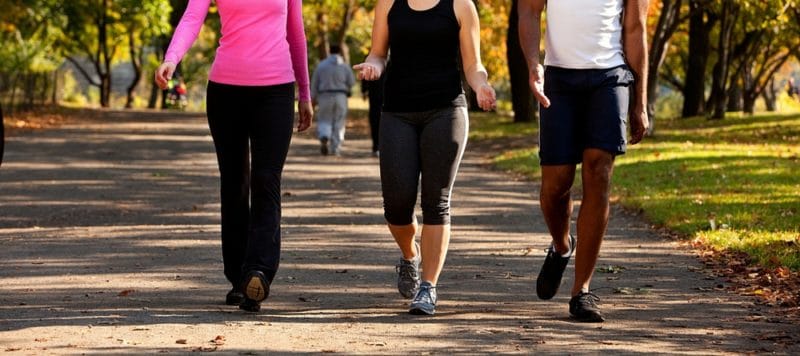You’ve been doing everything right, following every piece of weight loss advice you’ve ever gotten and still, the scale refuses to move.
In this article
This, unfortunately, is a pretty common situation and the reason why I often encounter the question “Why do I have a slow metabolism?”
While there are some genetic factors involved in deciding the speed of your metabolism, the fact is that you can change – and improve – things. You are not locked in to a slow metabolism for the rest of your life.
The problem, though, is that people in general have been misled when it comes to their weight.
In fact, there are four key myths that many people live by that are absolutely sabotaging their weight loss goals – and possibly causing even larger damage to their overall health.
As I mentioned, however, it’s not hopeless. You can change your metabolism. But first, we have to identify these problem areas and get rid of those ideas that are holding you back. So, let’s jump into it.
The 4 Myths Causing a Slow Metabolism
Myth #1: Eat Carbs for Breakfast
There’s really no easy way to say this, so I’m just going to put it out there: Most people do breakfast all wrong. Think about the standard (Western) breakfast.
You’ve got cereal, toast and juice. Maybe there’s some eggs or yogurt. Now, break it down into its macronutrients. What gets most of the focus here?
Carbohydrates.
In large part this is a leftover from some very clever marketing done around the turn of the 20th century.
During that time, doctors – who were often self-proclaimed – were beginning to understand that diet has a massive impact on human health and even behavior. Which is pretty cool.
Unfortunately, they took this idea and ran in pretty much the wrong direction.
Believing that meat and spicy foods were the cause of all of mankind’s ails – including sin and moral depravity – these “healthy experts,” whose names included Kellogg, Graham and Post, advocated a diet high in bland grain-based foods.
And, through years of incredible marketing and business magic, cereal become an American breakfast staple.
But why am I rambling about the history of cereal? How does cereal slow your metabolism?
It’s not so much cereal that’s the problem. Instead, it’s the remarkably high carb content found in this type of breakfast.
[Related: Eat THIS Healthy Breakfast Food for Faster Fat Loss]
When you first wake up, your cortisol levels are relatively high – exactly where they need to be to keep your muscles working, your brain functioning and your metabolism up to speed.
In fact, it’s at this point that your body is producing the appropriate dose of cortisol needed to trigger fat lose. (1)
So, we want to capitalize on that.
First thing in the morning, though, what do most people do?
They eat a carb-heavy breakfast. And numerous studies have found that carbohydrate intake directly blunts your cortisol response, effectively slowing your metabolism at a time when it should be elevated. (2)
Myth #2: Carbs are Bad
And that brings us nicely to our next myth: The idea that carbs are inherently bad for you.
Although the idea that carbs are evil and should be avoided has been around for a very, very long time, it really got going in the later 1990s with the Atkins Diet and similar approaches.
In fact, a 2014 Gallup poll found that 29 percent of Americans actively try to avoid carbs on a daily basis.
But it is true that low-carb diets cause weight loss. Often very quickly. The problem is that this isn’t necessary fat loss – in fact, it often isn’t. (3)
Why not?
Your body likes carbs. Specifically, it prefers glucose as a fuel for jut about everything you do.
But whatever glucose cannot immediately be used must be converted into glycogen and stored away in your muscles and liver. Depending on your body composition and fitness level, the average person can usually store about 500g of carbohydrates. But each gram of carbs that you pack away brings with it around 4g of water. (4)
That means that you could be carrying around as much as 4.5lbs of water, just to keep your glycogen stores up.
So, a low carb diet, which greatly reduces those stores also leads to a massive drop in water weight. Again, however, that doesn’t necessarily mean that you’ll be losing fat – which is what really matters.
Of even bigger concern, though, is that low carb diets have been shown to decrease thyroid function – specifically causing a drop in the hormone T3. (5)
Since your thyroid has a huge impact on your metabolism, anything that could interfere with it’s normal function is not a good idea.
Myth #3: You Must Eat 5-6 Meals Each Day
Somewhere along the line, the idea that you have to eat 5 or 6 small meals each day picked up some pretty impressive popularity. The theory is that, like a fire, your metabolism needs to be stoked throughout the day by regularly adding fuel.
Without regular caloric intake, proponents claim, your body will think that you’re in danger and start to store fat.
This, however, is just plain wrong.
Studies have never been able to back up these claims. But they have been able to contradict it.
One 2010 study, found that as long as your total caloric intake stayed the same, it didn’t really matter how you divided up your meal throughout the day. (6)
Beyond being just incorrect, though, the 5-meal-a-day theory could actually contribute to weight gain. For one thing, you’re eating more which will make it more difficult to keep your calories under control.
[Related: Intermittent Fasting for Fat Loss (Or Is 5 Meals per Day Better)?]
But those frequent meals will also keep your blood sugar levels chronically high which, in turn, will do the same for your insulin levels. And insulin is, among other things, a storage hormone. The more insulin you have in your system, the more fat you pack away.
Myth #4: Walking Is Enough Exercise
Please don’t misinterpret this: Walking is great. But it should just sort of be part of your everyday routine.
Your body is, after all, built to move. And walking is a pretty basic part of that.
Walking is not, however, enough of an exercise in most cases to stimulate any meaningful weight loss. It will also likely have very little lasting impact on your metabolism.
Why not?
First, it’s just not challenging enough. It’s really that simple.
Your body is used to carrying around your body weight – and is pretty good at it. Walking, then, does not ask your muscles to do anything that they aren’t already totally equipped to do.
[Related: Walking for Weight Loss: 2 Clever Ways to Walk off 25 Pounds]
But walking also does very little to stimulate and build your muscle fibers. Since muscle is a particularly hungry tissue – gobbling up tons of calories even when you’re at rest – it has a major impact on your overall metabolism.
To create lasting change in your metabolism, then, you need to build and challenge your muscle fibers. Walking just doesn’t do this adequately.
Instead, you need to be strength training.
Specifically, you need to be lifting heavy weights with an emphasis on large, compound movements that involve multiple large muscle groups. This type of exercise causes microscopic damage to your muscles, telling your brain that they need to be rebuilt bigger and stronger.
And hungrier.
Again, this does not mean that walking is useless.
On the contrary, you should be walking every day just to avoid being sedentary. Even if you are regularly strength training, walking is a perfect way to stay active on your rest days and can even help you to recover from your workouts by keeping your muscles loss and helping the nutrients you need to fully circulate through your body.




